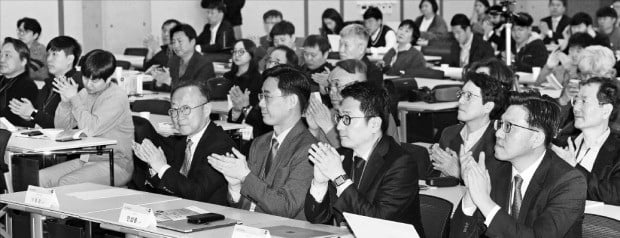Department News
[The Korea Economic Daily] “‘Optimal Smart Factory’ for Small-scale Businesses”
SNU ‘Optimal Smart Factory Forum’<?xml:namespace prefix = "o" ns = "urn:schemas-microsoft-com:office:office" />
’Optimal Equipment’ According to Each Industry
Various Testbeds Must be Provided

‘Optimal smart Factory Forum,’ co-hosted by SNU College of Engineering and the Korean Economic Daily, was held at SNU Xi Jinping Hall on Mar 4. The forum discussed possible smart factory strategies for small- and medium-scale businesses. (From right, front row) Attending the opening ceremony: Jae-Won Lee, Managing Director of Hojeon Ltd; Prof. Byeng Dong Youn, CEO of OnePredict; Prof. Sung-Hoon Ahn, SNU Dept. of Mechanical and Aerospace Engineering; Jonghoon Seok, head of the Office of Venture Startup Innovation at the Ministry of SMEs and Startups. / by Kyung-hoon Shin khshin@hankyung.com
“Unlike big corporations, small-scale businesses, due to their limited technology and financial resources, require an ‘optimal smart factory’ which is only equipped with functions that are absolutely necessary.”
Prof. Sung-Hoon Ahn of SNU Dept. of Mechanical and Aerospace Engineering, head of SNU Smart Factory Committee, spoke at the ‘Optimal Smart Factory Forum’ held at SNU Xi Jinping Hall on March 4. “Small- and medium-sized businesses are still skeptical about installing smart factories,” he said, emphasizing the need for optimal smart factories. According to Prof. Ahn, ‘appropriate technology’ refers to technological applications that are optimized in accordance with the environmental, economic, and social conditions of a location. Appropriate technolology costs less and is easy to learn. Prof. Ahn said that “smart factories can be operated at a low cost if we install optimized technology systems” and that “spreading smart factories among small- and medium-sized businesses must be based on appropriate technology.”
Small-scale Businesses “Can’t Afford Large Expenditures for Equipment”
Optimal Smart Factory forum was co-hosted by SNU College of Engineering and the Korea Economic Daily, for the purpose of sharing strategies and successful examples of smart factories. The forum discussed the topic of ‘Korean smart factory model visions and examples for small- and medium-scale businesses.’ Over 150 professionals from academia, research institutes, and businesses attended the event.
The speakers agreed that “small-scale businesses do not have to be intimidated by the concept of smart factories.” Kyung-jin Oh, Vice President of Taelim Industrial Co., Ltd., spoke that “it is hard for small businesses to invest a large amount of money in high-tech smart factories, considering the current market situation with minimum wage policy and stagnation in foreign markets.” He said that “since 2016, Taelim has focused on maximizing the efficiency of already existing factories using the data collected by our manufacturing execution system (MES). We selectively applied smart factories, discarding projects with low sustainability and cutting back costs, which led to effective decision-making for the company.”
Hojeon Ltd., a clothing company, explained that optimal smart factories allows for factory automation at a low cost. Since 2017, Hojeon has been working with SNU in an industry-university cooperation, building smart factories by applying ICT to its manufacturing process.
“Smart Factory Testbeds Needed”
Detailed proposals followed during the discussion session. Gyu-bong Lee, Vice President of the Korea Smart Manufacturing Industry Association, said that “many different types of testbeds (demo factories) should be offered so that companies can set up their own optimal smart factories according to their field” and that “this way, various businesses in automobile, shipbuilding, and electronics industry could see the know-hows of smart factory management and set up their own models.” There was also the suggestion that industry-university cooperation should work to produce smart factory professionals, like Germany’s RWTH Aachen University, dubbed as the ‘MIT of Europe.’ Jichung Yang, Senior Researcher of SNU College of Engineering, advised that “cooperating with businesses, the university should be responsible for developing smart factory technologies and training young scientists and engineers.”
Link to article http://news.hankyung.com/article/2019030490021

